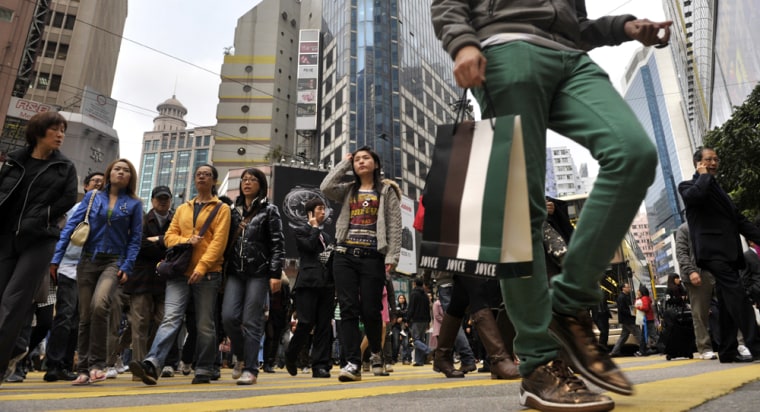For centuries, Hong Kong has thrived as a trade gateway between China and the rest of the world. As China's booming export engine has raised the flow of capital in and out of the mainland, Hong Kong has risen with it.
But China's historic boom has led to increasing tensions with its trading partners, who have cried foul, arguing that an undervalued yuan and surging trade surpluses are proof that Beijing isn’t playing fair.
Now, Hong Kong's historic role as the go-between for East and West could become an important part in diffusing the increasingly contentious global economic battle known as the "currency wars."
Though the yuan cannot be freely traded on global currency markets, Beijing’s leaders have recently eased controls on currency flows between Hong Kong and the mainland.
Under pressure With the economies of the developed world limping their way out of a deep recession, China is under strong pressure to relax its currency controls. Keeping a lid on the value of the yuan, trade partners complain, gives China an unfair advantage by making its products cheaper to export.
But Beijing also faces demands to relax controls on the expanding wealth of Chinese households and companies.
"The thing that's going to drive China to change its yuan policy is ultimately not going to be pressure from the West,” said Romnesh Lamba, head of market development for the Hong Kong Stock Exchange. “They will start changing it when they have no choice because their people will want to get some of that money out of China. That is going to be the greatest driver.”
China's leaders acknowledge that the government will need to relax currency controls over time. To ease the transition, they've begun easing controls between Hong Kong and the mainland, creating a kind of currency stepping-stone with the rest of the world.
Hong Kong officials say they're ready, and well-positioned, to take on that role.
“We want to be the offshore center for (the yuan),” said John Tsang, Hong Kong’s Financial Secretary.
China’s booming economy and ambitious westward expansion has brought a flood of new capital. Foreign direct investment has surged, headed for $100 billion a year. That’s attracted a wave of new players to Hong Kong’s financial services industry.
“This year, we are seeing double the number of people coming into Hong Kong - and mostly in financially related jobs,” said Thompson.
A stepping stone
As the flow of foreign capital through Hong Kong to mainland China increases, the city's financial services industry is also gearing up to help Chinese companies expand overseas. The hope is that mainland businesses see Hong Kong as a stepping stone to the rest of the financial world.
“They come to Hong Kong first because it is a place where they can they can learn all the rules and regulations,” said K.C. Kwok, a University of Hong Kong economist. “If they go straight to New York, they’re in the middle of nowhere. They don’t know the people, they don’t the language, they don’t know the customs, they don’t know the regulators … a lot of problems.”
Hong Kong’s finance industry is also hoping to help Western businesses solve problems when they try to get established or expand operations on the mainland. Competing in an economy dominated by state-owned enterprises calls for a skill-set many foreigners lack.
In its role as a money center, Hong Kong faces competition from Shanghai, the largest, fastest-growing financial hub on the mainland. Hong Kong officials and business leaders tend to play down the rivalry. They argue that Hong Kong offers businesses less government interference and a better-established set of laws to settle commercial disputes.
“The laws (on the mainland) are inconsistent and inconsistently applied,” said Dickson Leung, a senior partner in Lehman Brown, an accounting firm.
Hong Kong also could play a role in political reforms on the mainland. According to the timetable spelled out when this former British colony reverted to Chinese rule in 1997, democratic reforms, including local government elections, are scheduled to begin in 2017.
Chinese officials describe the relationship between Hong Kong and the mainland as "one country, two systems." Most people expect that distinction to remain for some time, as Beijing's leaders pursue a form of capitalism in which the state, not the free market, allocates resources and capital.
As those two forms of capitalism continue to interact around the world, Hong Kong is hoping to remain at the middle of that intersection.
“This is the first time since 1850 that the global capitalist system is experiencing the rapid rise of a continent-sized, capitalist power that’s different from the dominant Anglo-American system of capitalism,” said Christopher McNally, a political economist at the East West Center in Honolulu. “Whatever China does now has an immediate impact on the global economy.”
